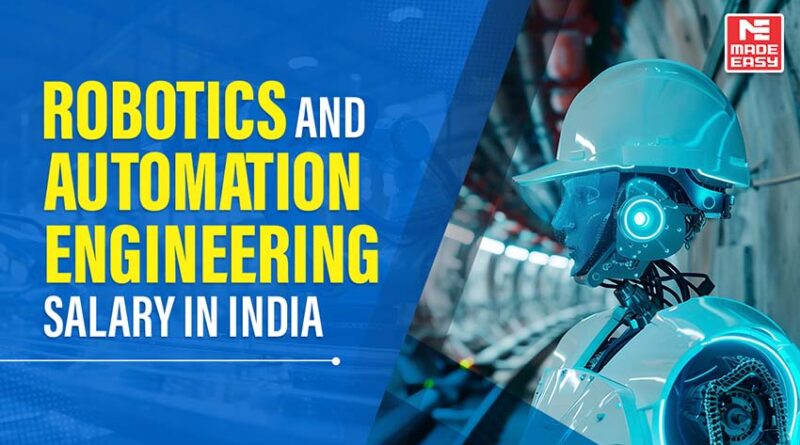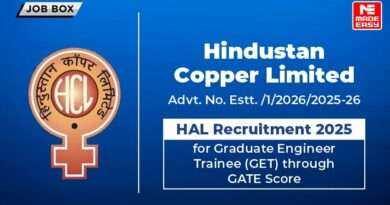Robotics and Automation Engineering Salary in India
Robotics and Automation is an interdisciplinary field that is a combination of the fundamentals of mechanical engineering, computer science, and electronics engineering to design and create robots and automation systems. We can see a sudden surge in India as various industries such as manufacturing, healthcare, agriculture, defense, and others are adopting automation to grow. The field of robotics and automation is reshaping Indian industries. Government of India initiatives such as ‘Make in India’ and ‘Digital India’ are likely to create more opportunities in this field. This will increase the demand for skilled engineers, and that is why aspirants look forward to their careers in robotics and automation. The increase in demand is directly proportional to the handsome salary a skilled robotics and automation engineer can seek.
Our blog aims to discuss the Robotics and Automation Engineering Salaries in India, along with brief information about the education qualifications, skills, and opportunities in the private and government sectors. The blog will clarify our readers’ doubts if one is thinking of pursuing a career in this field, as financial stability is one of the major factors in pursuing a specialization.
Table of Contents
Overview of Robotics and Automation Engineering
Robotics and Automation Engineering is the study of designing and creating machines to perform tasks that are usually done by humans in order to increase efficiency, accuracy, and safety in various industries. With the rapid advancement of technology over recent years, the opportunity in robotics and automation engineering will continue to expand while contributing to the betterment of Indian society and economy.
Educational Qualifications
If you are considering pursuing robotics and automation as a career, then a bachelor’s degree in engineering is required. A B.E./B.Tech. degree in mechanical engineering, computer science, electronics engineering, robotics engineering, automation engineering, mechatronics engineering, or a specific field of engineering provides fundamental knowledge.
Further, one can consider choosing higher education if looking to pursue robotics or automation engineering. This will be beneficial for the candidate as it opens doors for new opportunities and advances your level of knowledge.
- Masters degree: A masters degree in robotics, automation engineering, or robotics and mechatronics engineering provides advanced-level knowledge.
- Certification: Additional certification in this technology or programming language can enhance your knowledge.
- PHD: A doctoral degree in a relevant engineering field for research or academic purposes is required.
Skills required
To achieve a successful career in robotics or automation, one has to acquire some specialized knowledge and skill set, such as:
- Proficiency in programming languages such as Python and C++.
- A comprehensive understanding of robotics software like ROS (Robot Operating System).
- Knowledge of mechanical design and CAD tools like AutoCAD and SolidWorks.
- Comprehensive knowledge of circuits, sensors, robotic vision systems, actuators, and microcontrollers to understand robotic systems.
- Understanding machine learning and artificial intelligence
- In-depth knowledge of control systems.
With these technical skills, one needs to acquire analytical and problem-solving skills, a strong foundation in mathematics and physics, innovative thinking, precision and attention to details, communication skills, and adaptability to learn about evolving technologies.
As we now know about the education criteria and skills required to pursue a career in this field, let’s explore the various concepts needed in this interdisciplinary branch.
Mechanical Engineering:
The key concepts in mechanical engineering are designing and creating the physical structure of robots, focusing on aspects like kinematics, dynamics, material science, and thermodynamics.
Computer Science:
Topics from the computer science branch include programming languages and developing algorithms to operate robotic systems.
Covering specializations like artificial intelligence, machine learning, computer vision, and real-time computing.
Electronics Engineering:
This involves topics such as circuitry, sensors, and actuators to control robot systems. Microcontrollers, embedded systems, and signal processing to ensure data transmission and power supply. Control systems is one of the significant topics that focuses on systems that manage the behavior of robots and automation systems.
Salary of robotics and automation engineers in India
Robotics and Automation Engineers are not bound to any specific industry. This is a field that belongs to diverse industries that contribute to and transform businesses. There are several types of key roles and job profiles in robotics engineering and automation engineering.
Now we’ll explore some of the trending job titles in robotics engineering and automation engineering, along with the expected salary.
| Job Profile | Salary (Per Year) |
|---|---|
| Robotics Process Automation Developer | ₹ 4,50,000- ₹ 11,00,000 |
| Robotics Automation Engineer | ₹ 1,50,000 – ₹ 10,00,000 |
| Senior Robotics Software Engineer | ₹ 3,50,500 – ₹ 11,00,000 |
| Senior Robotics Developer/Programmer | ₹ 6,00,000 – ₹ 10,00,000 |
| Senior Robotics Automation Engineer | ₹ 6,70,000 – ₹ 20,00,000 |
| Mechanical Robotics Engineer | ₹ 5,00,000 – ₹ 11,00,000 |
| Electrical Robotics Engineer | ₹ 5,00,000 – ₹ 10,00,000 |
| Software Robotics Engineer | ₹ 6,00,000 – ₹ 12,00,000 |
| Control Systems Robotics Engineer | ₹ 4,00,000 – ₹ 10,00,000 |
| Robotics Research Engineer | ₹ 7,00,000 – ₹ 17,00,000 |
| Automation Robotics Engineer | ₹ 5,00,000 – ₹ 11,00,000 |
| Robotics Testing and Quality Control Engineer | ₹ 5,50,000 – ₹ 8,00,000 |
| Aerospace Robotics Engineer | ₹ 6,00,000 – ₹ 15,00,000 |
| Medical Robotics Engineer | ₹ 8,00,000 – ₹ 16,00,000 |
| Human-Robot Interaction Engineer | ₹ 5,50,000 – ₹ 12,00,000 |
| AI and Machine Learning Robotics Engineer | ₹ 8,50,000 – ₹ 16,00,000 |
| Robotics Sales Engineer | ₹ 5,50,000 – ₹ 11,00,000 |
| Control Systems Engineer | ₹ 4,00,000 – ₹ 15,00,000 |
| Process Automation Engineer | ₹ 3,50,000 – ₹ 16,00,000 |
| Industrial Automation Engineer | ₹ 3,50,000 – ₹ 18,00,000 |
| Software Automation Engineer | ₹ 4,00,000 – ₹ 22,00,000 |
| Building Automation Engineer | ₹ 3,50,000 – ₹ 16,00,000 |
| Automotive Automation Engineer | ₹ 4,00,000 – ₹ 20,00,000 |
*The salary structure may vary depending on the location, company, project you’re working on, skill sets, education, experience, market demands, technological advancements, etc.
Top private companies that have been hiring robotics and automation engineers are:
- Microsoft
- Tesla
- Amazon
- Bosch
- Tata Motors
- Larsen & Toubro
- Honeywell Automation India
- ABB India
- Fanuc India
- Kuka Robotics India
- Infosys
- Wipro
- Siemens
- Schneider Electric
- General Electric (GE)
The Government of India has also been providing growing opportunities for robotics and automation engineers with a handsome salary, job security, perks, and benefits, along with contributing to the nation’s growth.
- Defense Research and Development Organisation (DRDO)
- Indian Space Research Organisation (ISRO)
- HAL (Hindustan Aeronautics Limited)
- NHPC (National Hydroelectric Power Corporation)
- ONGC (Oil & Natural Gas Corporation)
- Ministry of Electronics and Information Technology (MeitY)
- Department of Science and Technology (DST)
- Council of Scientific and Industrial Research (CSIR)
- National Skill Development Corporation (NSDC)
If we talk about the salary range in government organizations, it might seem lower compared to what the private sector offers. The salary structure ranges from 6 LPA to 8 LPA. But a government job comes along with job security, stable job progression, and other perks and benefits. It gives candidates the opportunity to work on projects that are important for the nation’s security. The experience of working in the government sector will always be beneficial later in a career as compared to high-paying salaries in the private sector.
There is a general process to follow while applying:
- Visit the official website and find detailed job notifications.
- Check the eligibility criteria.
- Fill out the application form.
The selection process may involve recruiting through competitive exams like GATE, written exams, or direct interviews.
With initiatives like ‘Make in India’ and ‘Digital India‘, we can see tremendous growth in this field. And so it is important to prepare well for the exams conducted by the above-mentioned prestigious government organizations. GATE score is also one of the ways to get recruited. MADE EASY for almost two decades has been a strong support for candidates preparing for government engineering exams like GATE and ESE, along with reliable study material for DRDO and ISRO exams. Given below are links for the candidates to check out our courses and study material for strategic preparation:
- GATE : 1 Year Foundation Course
- GATE : 1 Year Flexi Course
- DRDO, ISRO : Mechanical Engg. Prev Sol Papers
- DRDO ISRO : Electronics Engg: Prev Sol. Papers
Top colleges for Robotics and Automation Engineering in India
- Indian Institute of Technology Delhi (IIT Delhi)
- Indian Institute of Technology Bombay (IIT Bombay)
- Indian Institute of Technology Kharagpur (IIT Kharagpur)
- Indian Institute of Technology Madras (IIT Madras)
- Indian Institute of Technology Kanpur (IIT Kanpur)
- National Institute of Technology Karnataka (NITK Surathkal)
- Vellore Institute of Technology (VIT)
- Anna University
- Birla Institute of Technology and Science (BITS), Pilani
- Delhi Technological University (DTU)
- College of Engineering, Pune (COEP)
Now that we have talked about the brief of robotics and automation engineering along with the salary range of robotics and automation engineers, it is pretty much clear how this field has immense potential in both the private and government sectors. And as technology evolves, we can further witness the growth of robotics and automation in our country.
MADE EASY Study Material
MADE EASY has been constantly supporting GATE and ESE aspirants by offering quality lectures, reliable study material, new courses, and expert guidance for their preparation journey. Our team has curated online study material for the engineering students preparing for government engineering exams. Find below the link of study materials of the key concepts of various engineering branches:
- Computer Science & Information Technology (CS)
- Electronics and Communication Engineering (ECE)
- Electrical Engineering (EE)
- Mechanical Engineering (ME)
FAQs:
1. What is the salary of a robotics engineer in India per month?
Ans. The average salary of robotics engineers in India may range between 5 LPA and 25 LPA, depending on which sector one is working in.
2. What is automation and robotics engineering?
Ans. Automation and robotics engineering is an interdisciplinary field that involves the design, creation, and application of robots and automated systems.
3. What to do for robotics engineering?
Ans. If considering pursuing a career in robotics and automation engineering, one must acquire a B.E. or B.Tech. degree in mechanical engineering, computer science, electronics engineering, robotics engineering, automation engineering, mechatronics engineering, or a specific field of engineering that provides fundamental knowledge.
4. What are the subjects in robotics and automation engineering?
Ans. The core subjects in robotics and automation engineering are engineering mathematics, physics, chemistry, programming languages, control systems, microcontrollers and PLCs, robotics, sensors and instrumentation, machine design, electrical machines, and power systems. The subjects and syllabus may vary depending on the colleges and universities.
Dear Aspirants,
Your preparation for GATE, ESE, PSUs, and AE/JE is now smarter than ever — thanks to the MADE EASY YouTube channel.
This is not just a channel, but a complete strategy for success, where you get toppers strategies, PYQ–GTQ discussions, current affairs updates, and important job-related information, all delivered by the country’s best teachers and industry experts.
If you also want to stay one step ahead in the race to success, subscribe to MADE EASY on YouTube and stay connected with us on social media.
MADE EASY — where preparation happens with confidence.

MADE EASY is a well-organized institute, complete in all aspects, and provides quality guidance for both written and personality tests. MADE EASY has produced top-ranked students in ESE, GATE, and various public sector exams. The publishing team regularly writes exam-related blogs based on conversations with the faculty, helping students prepare effectively for their exams.




